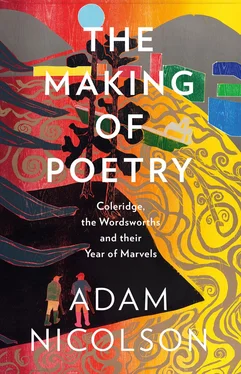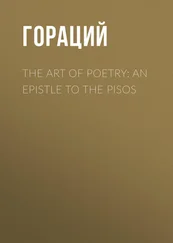1 ...7 8 9 11 12 13 ...21 Coleridge described her in a letter written a few weeks after he had arrived at Racedown:
Wordsworth & his exquisite Sister are with me – She is a woman indeed! – in mind, I mean, & heart – for her person is such, that if you expected to see a pretty woman, you would think her ordinary – if you expected to find an ordinary woman, you would think her pretty! – But her manners are simple, ardent, impressive –
Above all they noticed each other’s eyes. Hers were ‘watchful in minutest observation of nature – and her taste a perfect electrometer – it bends, protrudes, and draws in, at subtlest beauties & most recondite faults’. His were large and grey, lit and sparkling when animated, sometimes half-absent, as if he had sunk a quarter of an inch below the surface of the skin, but otherwise rolling bright towards you, as if the sight within them were not a receptive faculty but active , coming and reaching out to grasp his hearers. The lower part of his face could look somehow unbuttoned. His mouth was always hanging half open – he couldn’t breathe through his nose. ‘I have the brow of an angel, and the mouth of a beast,’ he used to say, the repeated binary vision of himself, great and weak, good and bad, never ceasing to oscillate between its poles.
She saw a poet in him. ‘He is a wonderful man,’ she wrote to her great friend Mary Hutchinson, who had been staying with them at Racedown and had left only a day or two earlier.
His conversation teems with soul, mind, and spirit. Then he is so benevolent, so good tempered and cheerful, and, like William, interests himself so much about every little trifle. At first I thought him very plain, that is, for about three minutes: he is pale and thin, has a wide mouth, thick lips, and not very good teeth, longish loose-growing half-curling rough black hair. But if you hear him speak for five minutes you think no more of them. His eye is large and full, and not dark but grey; such an eye as would receive from a heavy soul the dullest expression; but it speaks every emotion of his animated mind: it has more of ‘the poet’s eye in a fine frenzy rolling’ than I ever witnessed. He has fine dark eyebrows, and an overhanging forehead.
In return she sparkled with her own sharp-edged, discontinuous brilliance, a flashing light in her eyes, her mind not a grand instrument of connection like Coleridge’s, nor vastly present to itself like Wordsworth’s, but full of bright remembered visions, exactly recalled, seen in detail: the sky-blue hedge sparrows’ eggs in a childhood nest, the bilberries in the bowl of a black porringer. She had the gift of what Keats would later call ‘that trembling delicate and snail-horn perception of Beauty’, precise and sensitive, alert to variation. The sensitivity meant, as Coleridge noticed, that her horns would draw in at the slightest touch, and she would easily weep at things seen or remembered. She often felt her heart was full. Her separation from her brothers in childhood meant that she had been ‘put out of the way of many recollections in common’, and that separation only served to heighten the value of closeness for her. She and Wordsworth now shared their everyday life, but they also shared the experience of a mutual absence when young, and then the denial by the Lonsdale estate of their inheritance, the compulsory impoverishment in which they were both now living.
So much had been denied to them, and so much had been broken, that it was her duty to tend to her brother. She was both stronger and weaker than him. He may have been, as he wrote, the mountain and she its flowers, yet he was broken and she was the mender of him. She loved him but she could admonish him, just as later she could tell Coleridge not to publish an unkind review, as it was beneath him and its value as criticism was not greater than its cruelty.

Dorothy on the path of poetry
She saw her own and her brother’s situation clearly enough: ‘We have been endeared to each other by early misfortune,’ she told a friend. Their love may or may not have sublimated the sexual – there is no evidence at all of anything approaching incest – but the form it took was admiration, protection and education, enabling him to leave behind the extremes of his broken self within her shelter and become the greater and more vulnerable poet she believed him to be. He had been addicted to a kind of exclusive masculinity, and only within her care, the shield of her above and around him, could he find the courage to melt and grow.
In The Prelude he said as much to her:
I too exclusively esteemed that love,
And sought that beauty, which as Milton sings,
Hath terror in it. Thou didst soften down
This over-sternness; but for thee, sweet friend,
My soul, too reckless of mild grace, had been
Far longer what by Nature it was framed –
Longer retained its countenance severe –
A rock with torrents roaring, with the clouds
Familiar, and a favourite of the stars;
But thou didst plant its crevices with flowers,
Hang it with shrubs that twinkle in the breeze,
And teach the little birds to build their nests
And warble in its chambers.
Their intimacy was real. ‘Neither absence nor Distance nor Time can ever break the Chain that binds me to my Brothers,’ she wrote. They would wrap up together inside a single coat to stay warm. Her breath, he said, ‘was a kind of gentler spring/That went before my steps’.
Dorothy, or Dolly as she had been called by her parents, loved robins, and there was something robin-like about her: the needle brilliance of their song, their alert restlessness, the tiny, flicker-instant acuity of body and being. She was not sweet in her person, more ardent than that, with a gypsy wildness in her, so that her eyes burned and flashed for almost anyone who met her, like the gold leaf in the electrometer that Coleridge saw.
It was this quality, her ability to respond to the instant, with an immediate attachment to what was in front of her eyes, that allowed her to teach the men around her how to see the world. Joseph Gill’s diary shows that he bought her a notebook when they were at Racedown, but it has disappeared, and there is no written record of what she had been seeing there, as there is for part of the following year in Somerset. But when in March 1798 she wrote in her journal that ‘A quiet shower of snow was in the air,’ that is a moment, as Pamela Woof has written, that tells you who she was. The snow in Dorothy’s perception is ‘simultaneously both hovering and falling; the silent snow stays and does not stay in the air. Dorothy conveys at once the temporary and the timelessness.’ Those moments of transient beauty were part of her daily experience. She saw ‘the moonshine like herrings in the water’, and the moonlight lying on the hills like snow. Categories blurred: the change of season became an active, animated process: ‘The Fern of the mountain now spreads yellow veins among the trees’; the stars were ‘almost like butterflies or skylarks in motion & lightness’. She heard the ‘unseen birds singing in the mist’ and saw the ‘turf fading into mountain road’. She loved to look for nests in the privet and the roses; everything was part of a naked meeting with an exactly encountered and constantly shifting world.
There was nothing saccharine about this. She loved ‘the strength with which nature has endowed me’, and was indifferent to the demands and limits of femininity, loving solitary walks alone in the moonlight when in her early twenties, not submitting to the kind of ignorance thought suitable for many girls of her class and upbringing, socially engaged, giving money to beggars. She was busy, practical, organising a household around the poet who lived alongside her, broiling the gizzard of a hen with some mutton for his supper, baking bread and pies, sewing and laundering, writing letters, copying out his verses.
Читать дальше













